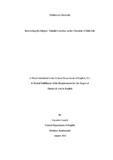Please use this identifier to cite or link to this item:
https://elibrary.tucl.edu.np/handle/123456789/2800| Title: | Recovering the Subject: Valmiki's Joothan as the Chronicle of Dalit Life |
| Authors: | Gaudel, Upendra |
| Keywords: | Indian literature;Indian Novel;Joothan;Dalit Movement |
| Issue Date: | Aug-2012 |
| Publisher: | Central Department of English Kirtipur, Kathmandu |
| Abstract: | This research examines Omprakash Valmiki's Joothan as a tale of domination, subordination and hegemony imposed upon the lower caste and class in Indian society. The Hindi word Joothan literally means food left on plate, usually destined for the garbage pail in a middle class urban home. However, such food would be characterized as Joothan only if someone else were to eat it. The word carries the connotation of ritual purity and pollution, because Joothan means polluted. In Joothan, Omprakash Valmiki deals with the issue of humiliation meted out of the Dalits by Indian society, no matter where they lived. This humiliation stems from the fact that Dalit inferiority has gotton embedded in the psyche of the upper caste, the members of which have developed on extraordinary repertoire of idioms, symbols and gestures of verbal and physical lenigration of the Dalit over centuries. It is embedded in the literary and artistic imagination and sensibility of the upper caste. Joothan stridently asks for the promissory note, joining a chorus of Dalit voice that are demanding their rightful place under the sun. A manifesto for revolutionary transformation of society and human consciousness, Joothan confronts it's readers with difficult questions about their own humanity and invites them to join the universal project of human liberation. |
| URI: | http://elibrary.tucl.edu.np/handle/123456789/2800 |
| Appears in Collections: | English |
Files in This Item:
| File | Description | Size | Format | |
|---|---|---|---|---|
| thesis n cover.pdf | 277.68 kB | Adobe PDF |  View/Open |
Items in DSpace are protected by copyright, with all rights reserved, unless otherwise indicated.
